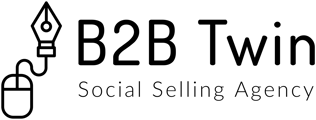Rethinking Governance with B2B Social Selling
B2B social selling requires a governance framework that ensures ethical conduct.
SALESSOCIAL SELLINGSTARTUPSB2B


In today’s digital age, businesses constantly seek innovative ways to connect with their customers and drive sales. One such method that is gaining popularity is B2B social selling. This approach involves leveraging social media platforms and networks to build relationships, generate leads, and sell products or services. However, as organizations embrace this new strategy, it becomes crucial to rethink governance practices to ensure successful implementation and mitigate potential risks.
Embracing change
Effective governance requires an assertive approach towards adapting to changes in the business landscape. With the emergence of B2B social selling, organizations must recognize its potential advantages and adjust their governance models accordingly. Businesses can tap into vast online communities, enhance brand visibility, and foster direct client engagement.
Defining guidelines
Governance in B2B social selling establishes guidelines that align with organizational values while addressing legal and ethical considerations. These guidelines should outline behavior on various social media platforms, clarify the boundaries between personal and professional engagements, and safeguard against potential conflicts of interest or data breaches.
Training and education
Given the relatively new nature of B2B social selling within many industries, it is critical to provide training and education programs for employees involved in these activities. Comprehensive training sessions can equip staff members with the skills to leverage social media platforms effectively while minimizing risks associated with inappropriate content or unauthorized disclosure of information.
Risk management
As with any business activity involving online interactions, B2B social selling poses certain risks that must be managed appropriately through robust governance practices. Organizations need to identify potential vulnerabilities, such as reputation damage because of inappropriate posts or comments from employees representing the company on digital platforms. By employing effective risk management strategies, businesses can safeguard their brand image and not undermine the overall purpose of B2B social selling.
Accountability and measurement
To ensure effective governance practices, it is essential to establish clear accountability and measurement frameworks. This includes establishing performance metrics to evaluate the success of B2B social selling efforts, monitoring adherence to established guidelines, and holding employees accountable for their actions online. Regular review meetings help identify gaps in governance protocols and ensure continuous improvement.
Collaboration with legal and compliance teams
Given the legal and regulatory implications associated with online activities, collaboration between the marketing team spearheading B2B social selling initiatives and the legal/compliance departments is vital. By involving these teams early, organizations can more effectively navigate potential risks around data privacy, intellectual property rights infringements, or non-compliance with industry regulations.
Leveraging analytics for decision-making
Governance should be driven by qualitative and quantitative insights to make informed decisions about B2B social selling. Analytical tools can provide valuable data on customer behavior patterns, content performance, lead generation success, and conversion rates. Using these insights enables businesses to refine their approach continually.
Conclusion
The rise of B2B social selling causes a rethinking of governance practices within organizations to harness its potential while managing associated risks effectively. By embracing change proactively, defining clear guidelines, providing training programs, implementing risk management strategies, establishing accountability frameworks, collaborating with legal/compliance teams, and leveraging analytics strategically - businesses can maximize the benefits of this innovative sales strategy.
In summary, the successful implementation of B2B social selling requires a well-structured governance framework that ensures ethical conduct while capitalizing on opportunities presented in the digital realm. By adapting governance practices, organizations can confidently embrace this maturing landscape and cultivate fruitful customer relationships through content and meaningful engagement on social media platforms.
